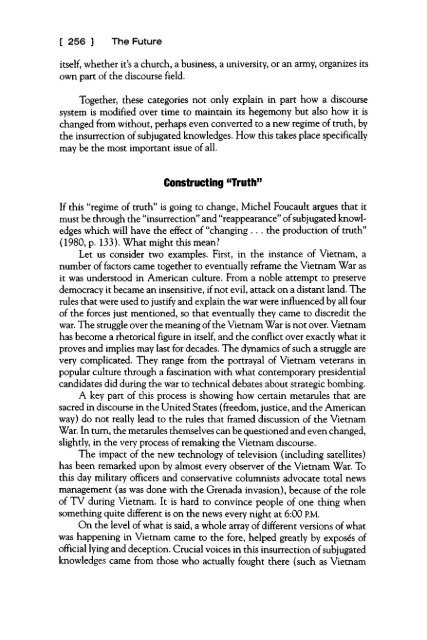entire book - Chris Hables Gray
entire book - Chris Hables Gray
entire book - Chris Hables Gray
Create successful ePaper yourself
Turn your PDF publications into a flip-book with our unique Google optimized e-Paper software.
[ 256 ] The Future<br />
itself, whether it's a church, a business, a university, or an army, organizes its<br />
own part of the discourse field.<br />
Together, these categories not only explain in part how a discourse<br />
system is modified over time to maintain its hegemony but also how it is<br />
changed from without, perhaps even converted to a new regime of truth, by<br />
the insurrection of subjugated knowledges. How this takes place specifically<br />
may be the most important issue of all.<br />
Constructing "Truth"<br />
If this "regime of truth" is going to change, Michel Foucault argues that it<br />
must be through the "insurrection" and "reappearance" of subjugated knowledges<br />
which will have the effect of "changing . . . the production of truth"<br />
(1980, p. 133). What might this mean?<br />
Let us consider two examples. First, in the instance of Vietnam, a<br />
number of factors came together to eventually reframe the Vietnam War as<br />
it was understood in American culture. From a noble attempt to preserve<br />
democracy it became an insensitive, if not evil, attack on a distant land. The<br />
rules that were used to justify and explain the war were influenced by all four<br />
of the forces just mentioned, so that eventually they came to discredit the<br />
war. The struggle over the meaning of the Vietnam War is not over. Vietnam<br />
has become a rhetorical figure in itself, and the conflict over exactly what it<br />
proves and implies may last for decades. The dynamics of such a struggle are<br />
very complicated. They range from the portrayal of Vietnam veterans in<br />
popular culture through a fascination with what contemporary presidential<br />
candidates did during the war to technical debates about strategic bombing.<br />
A key part of this process is showing how certain metarules that are<br />
sacred in discourse in the United States (freedom, justice, and the American<br />
way) do not really lead to the rules that framed discussion of the Vietnam<br />
War. In turn, the metarules themselves can be questioned and even changed,<br />
slightly, in the very process of remaking the Vietnam discourse.<br />
The impact of the new technology of television (including satellites)<br />
has been remarked upon by almost every observer of the Vietnam War. To<br />
this day military officers and conservative columnists advocate total news<br />
management (as was done with the Grenada invasion), because of the role<br />
of TV during Vietnam. It is hard to convince people of one thing when<br />
something quite different is on the news every night at 6:00 P.M.<br />
On the level of what is said, a whole array of different versions of what<br />
was happening in Vietnam came to the fore, helped greatly by exposes of<br />
official lying and deception. Crucial voices in this insurrection of subjugated<br />
knowledges came from those who actually fought there (such as Vietnam








